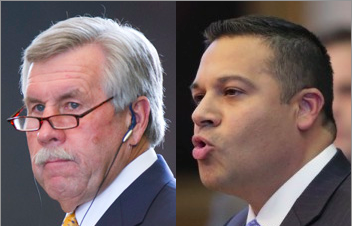
Building energy codes used to be a no brainer. Efficient homes and the technologies that go into reducing a homeowner’s electricity bill have even permeated into pop culture in shows like This Old House. But legislation filed by Sen. Troy Fraser (R-Horseshoe Bay) and Rep. Jason Villalba (R-Dallas) would make it harder for Texas, and cities in particular, to make new homes more energy efficient.
Let me get wonky just for a second. The bills, SB 929 and HB 1736, would modify Chapter 388 of the Health and Safety Code that establishes the Texas Building Energy Performance Standards.
What the bills would do
They would restrict local municipalities’ authority to adopt their own versions of building energy codes, limit adoption of new energy codes to every six years, create an unnecessary advisory committee, and allow amendments that might undermine energy efficient codes and air quality efforts.
Why these bills are bad
Right now, cities have the right to adopt codes that make new homes in their jurisdiction more energy efficient than the state minimum. Several cities have done this and have reaped the benefits in not only more affordable housing but also cleaner air. Energy codes have been a critical piece in plans to reduce pollutants like nitrous oxide (NOx). According to Texas A&M University’s Energy Systems Lab, energy codes are credited with reducing 500 tons of NOx per year. Cities must be able to use this low-cost tool to help clean the air, especially now that smog standards are expected to improve.
These calculations are currently being used as part of our State Implementation Plans. To protect the state’s air quality, the current law does not allow the adoption of weakening amendments or less stringent codes. Now is not the time to weaken codes.
The Energy Systems Lab has also estimated that the implementation of new codes in Texas has saved money, reduced demand, and cut pollution since statewide building energy codes were adopted in 2001.
Another Attack Against Cities
As followers of the 84th Legislature know, a major theme this year is restricting the rights of cities to pass their own laws. Add energy efficiency to the list of things under attack – such as local fracking bans and plastic bag ordinances.
These bills would prevent any municipality from adopting a more stringent code, undermining local control. They would disempower and stymie the progress of municipalities like the cities of Houston, Austin, Frisco, San Antonio, and more than 60 other municipalities that lead Texas in energy efficient building and have historically adopted more rigorous versions of energy codes. These cities enable new technologies and new building methods to be introduced and adopted ahead of statewide adoption of minimum codes.
Slowing down progress
Energy codes are updated every three years and stakeholders participate in the process. By adding an advisory committee and forbidding the adoption of new codes within six years, the Fraser and Villalba bills would inhibit the adoption of new innovations designed to improve the livability of new homes.
Serious consequences to allowing amendments
Finally, by allowing amendments to energy rating indexes, as these bills would allow the State Energy Conservation Office to do, the legislation might significantly deteriorate the efficiency potential of new codes. If pathways to code compliance are not in alignment and equivalent to one another, it could misrepresent home values to prospective homebuyers.
Better Energy Codes Save Money
The Energy Systems Lab estimated that implementation of new codes in Texas has saved money since statewide building energy codes were adopted in 2001. Cumulative statewide electricity savings over a 12-year period from (2002-2013) are estimated to be $2.9 billion (in the summer) and $2.9 billion (in the winter), with implementation costs totaling $1 billion. In addition, these savings have resulted in reducing the need to run power plants and have helped keep the lights on during peak winter and summer use.
Energy codes should be a no brainer for Texas’ elected officials. They reduce electric bills, reduce pollution, and are cost effective solutions that Texas needs to embrace.